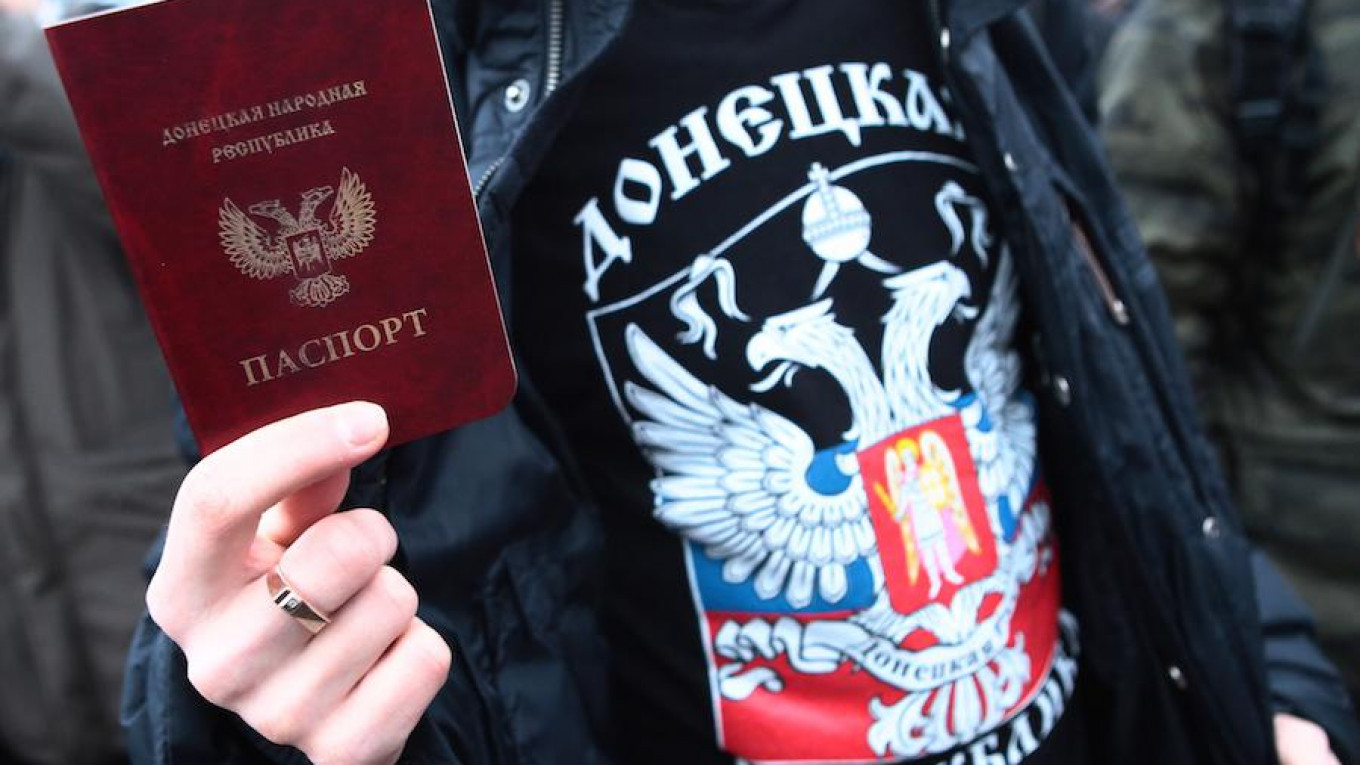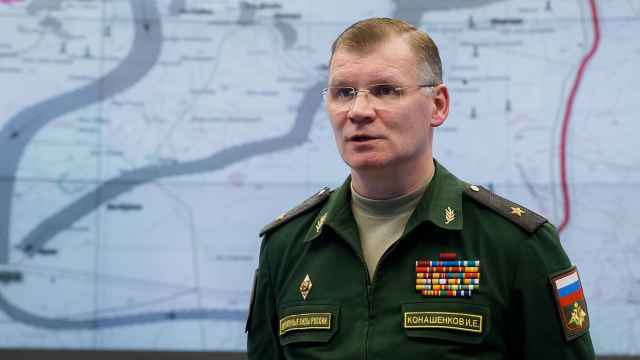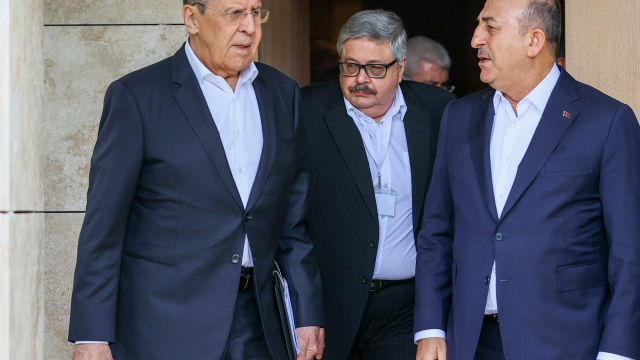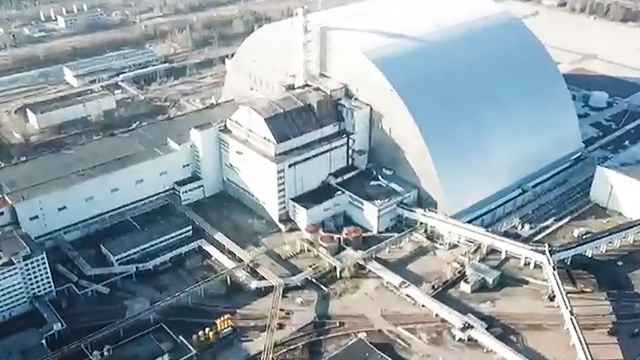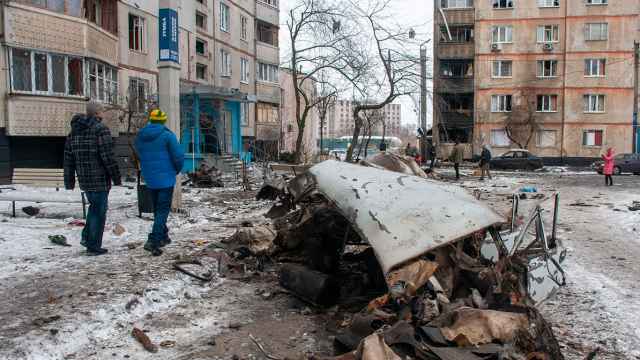It’s always hard to tell, but I don’t think that Vladimir Putin is planning to ramp up Russia’s war with Ukraine. At least, not today.
Three levels of background are in order here.
First, what happened today: Putin announced that Russia would offer expedited citizenship to residents of ‘certain’ parts of eastern Ukraine and then confirmed that he had in mind quite specifically the quasi-occupied territories knows as the Donetsk and Luhansk People’s Republics. Ukraine’s president-elect, Volodymyr Zelenskiy, promptly decried the move and called for increased sanctions.
Second, what happened before: Russia has a history of handing out passports in territories it has helped break away from other post-Soviet states, particularly Abkhazia and South Ossetia, which became de facto Russian protectorates after the Georgian civil war of 1993, a fait made more accompli when Russia itself went to war with Georgia in 2008 — in part to defend its citizens living in the territories. It’s not hard, then, to understand why the Kremlin’s move has Kiev on edge.
Third, what has happened elsewhere: Russia is not the only country in the region to play passport politics. Perhaps most notoriously, Hungary has extended citizenship to as many as a million ethnic Magyars living in neighboring countries, creating a very useful voting block for Viktor Orban and his ruling Fidesz party. A similar number of Moldovans, on the other hand, have gained Romanian — and thus EU — citizenship, on the basis of their own ethnicity. We could go on: Armenia and Karabakh, for example, or Turkey and Bulgaria.
But Russia’s approach to passport politics somehow seems different: more overtly aggressive and, unlike in Hungary, designed more to serve foreign policy purposes than domestic political ends.
And yet — while Kiev’s consternation is justified and Europe should absolutely be paying attention — I don’t think today’s news signals escalation in the offing. Here’s why.
Despite all the hot takes that Zelenskiy is somehow Putin’s man in Kiev (he’s not), the Kremlin most likely finds the post-election situation vis-a-vis Ukraine somewhat unsettling. Zelenskiy, after all, campaigned on a less confrontational line towards Russia than outgoing President Petro Poroshenko, and one of his few clear policy promises was to seek a cease-fire in the east. That, oddly enough, is a problem for Moscow.
As I (and others) have argued elsewhere, the Kremlin is reasonably happy with the current temperature of its conflict with the West. Sanctions themselves are basically priced into the Russian economy, as policymakers and business leaders operating on the assumption that they’re not going to be lifted or even appreciably eased in the foreseeable future.
Moreover, even as ordinary Russians seem to tire of geopolitics, the sense of conflict with the West and the ‘rally around the flag’ it engenders remain important to Putin’s legitimacy. Thus, were Kiev to seek a pathway towards normalization with Russia, it could undermine an important pillar of domestic political stability.
The Kremlin is reasonably happy with the current temperature of its conflict with the West.
Equally importantly, meanwhile, a Zelenskiy-led peace initiative would undercut one of the core tenets of Russian foreign policymaking, which is to maintain maximum maneuverability in all circumstances. As I have tried to argue before, Russia — usually finding itself institutionally and structurally weaker than its core opponents (not Ukraine, of course, but in this case Europe and the US) — maximizes its power by manufacturing and manipulating uncertainty. Keeping opponents guessing as to the Kremlin’s intentions and capabilities makes it harder for them to settle on and pursue a consistent strategy.
But no one is more of an unknown than Zelenskiy himself. Putin does not know — and, indeed, cannot know — how far the new Ukrainian president is willing to go, either in pursuit of de-escalation or in the prosecution of war, how far and in which direction he will be pulled by the tides of Ukrainian politics, and so on. At least potentially, Kiev has the opportunity to make Russia feel uncertain. Turnabout is fair play, after all.
The passportization move, then, seems designed to ensure that whatever new contours the conflict takes on, it will be on Moscow’s terms and timescale. Putin’s announcement left Zelenskiy no choice but to sound a lot like Poroshenko.
It also removed any doubt about the fate of the language law, which passed handily in the Rada only hours after the passport announcement. While not nearly as controversial domestically as many make it out to be, the law is almost certain to paint Ukraine in nationalist colors for European eyes — complicating any EU response to passportization.
We cannot know what the Kremlin means to do with its soon-to-be-minted citizens in Donbass. They could become a nice new voting block for United Russia, or else a casusbelli, or simply another drain on Russia’s pension fund. Once again, all eyes will necessarily focus on Moscow, as Zelenskiy and the EU wait to see what Putin’s next move will be.
Which, of course, is the point.
A version of this article was first published in Moscow-on-Thames.
A Message from The Moscow Times:
Dear readers,
We are facing unprecedented challenges. Russia's Prosecutor General's Office has designated The Moscow Times as an "undesirable" organization, criminalizing our work and putting our staff at risk of prosecution. This follows our earlier unjust labeling as a "foreign agent."
These actions are direct attempts to silence independent journalism in Russia. The authorities claim our work "discredits the decisions of the Russian leadership." We see things differently: we strive to provide accurate, unbiased reporting on Russia.
We, the journalists of The Moscow Times, refuse to be silenced. But to continue our work, we need your help.
Your support, no matter how small, makes a world of difference. If you can, please support us monthly starting from just $2. It's quick to set up, and every contribution makes a significant impact.
By supporting The Moscow Times, you're defending open, independent journalism in the face of repression. Thank you for standing with us.
Remind me later.



